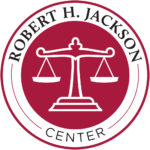Collections
-
Writings
- Law Review Articles about Robert H. Jackson
- Articles About Robert H. Jackson
- Books
- Early Life & Career (1892-1933)
- Treasury Department, Bureau of Internal Revenue (1934-1936)
- Assistant Attorney General, Tax Division (1936)
- Assistant Attorney General, Antitrust Division (1937)
- Solicitor General of the United States (1938-1940)
- Attorney General of the United States (1940-1941)
- Associate Justice of the Supreme Court (1941-1954)
- Nuremberg Prosecutor (1945-1946)
-
Photos
- Early Life & Career (1892-1934)
- Treasury Department, Bureau of Internal Revenue (1934-1936)
- Assistant Attorney General, Tax Division (1936)
- Assistant Attorney General, Antitrust Division (1937)
- Solicitor General of the United States (1938-1940)
- Attorney General of the United States (1940-1941)
- Associate Justice of the Supreme Court (1941-1954)
- Nuremberg Prosecutor (1945-1946)
-
Speeches
- Early Life & Career (1892-1934)
- Treasury Department, Bureau of Internal Revenue (1934-1936)
- Assistant Attorney General, Tax Division (1936)
- Assistant Attorney General, Antitrust Division (1937)
- Attorney General of the United States (1940-1941)
- Solicitor General of the United States (1938-1940)
- Associate Justice of the Supreme Court (1941-1954)
- Nuremberg Prosecutor (1945-1946)
- Supreme Court Opinions
An Unappreciated Heritage
On Tuesday, June 21, 1910, Jamestown High School held its annual Class Day, the 23rd such observance. Eighteen-year-old Robert Jackson of nearby Frewsburg, New York, who had spent the 1909-10 academic year as a post-graduate student at JHS and was graduating with its class of 1910, was selected to give the student oration of the day. His speech, which we today would call “environmentalist,” described Chautauqua County’s and Jamestown’s settlement and development and called for stewardship by current inhabitants of the beautiful region.
Compulsory Incorporation of the Bar from the Country Lawyer’s Viewpoint
The proposed compulsory incorporation of the bar has awakened little interest in the country lawyer and his voice has been unheard in the debate that preceded and followed the introduction of the measure. As the conditions under which I practice are more rural than urban, I approach this discussion from the viewpoint of the country lawyer.
Advocacy as a Specialized Career
Proposals of higher educational qualifications for admission to the bar bring out a sharp divergence of opinion between the metropolitan bar and sections of the upstate bar. The country lawyer does not appreciate the gravity of the evils that have developed in city practice, and the city bar cannot understand the rural lawyer's resistance to higher standards.
Functions of the Trust Company in the Field of Law
What has happened to those whom Woodrow Wilson called the "dwindling body of general practitioners, who used to be our statesmen"? A generation ago a lawyer was identified with the family fortunes, counseled the indiscreet youth, approved title to the new home that came with manhood, drew the articles of co-partnership or incorporation when a shop or store was acquired, collected the business accounts, drew the Will, handled settlement of the estate and then started over the same road with another generation.
An Organized American Bar
Critical re-examination of the structure of the American Bar Association is a manifestation of the bar's anxiety for its collective welfare. The same sense of insecurity as to the profession's future has initiated in every state movements to strengthen bar associations either by incorporation or by federation of existing voluntary bodies. Bar association speeches drop the old tone of self approval and take on a tone of apprehension and uneasiness.
Tribute to Mary Willard
On Wednesday afternoon, June 10, 1931, Jamestown attorney Robert Jackson was one of the speakers at the Jamestown Public Schools’ annual memorial exercises for former teachers and students. On this occasion, Jackson spoke in the Euclid Street School auditorium about his former high school teacher and important mentor Mary Rosina Willard, who had died earlier that year at age 74. Jackson’s speech, which was published in a local newspaper, also is contained in his papers in the Manuscript Division of the Library of Congress in Washington, D.C., Box 32.
Jamestown High School Dedication
On Friday evening, November 15, 1935, Robert Jackson spoke at the dedication of the newly-constructed Jamestown High School building. His speech is contained in his papers in the Manuscript Division of the Library of Congress in Washington, D.C., Box 32.
Tribute to Milton J Fletcher
On Thursday evening, June 30, 1932, Jamestown attorney Robert Jackson attended the dinner 64th annual reunion of his 1910 alma mater, Jamestown High School. At this event, which was held at the Hotel Jamestown, Jackson spoke about Milton Joseph Fletcher, the former JHS Principal (1888-1919) and then Jamestown School Superintendent (1919-1932), who was retiring.
What Price “Due Process”
The ease with which the foreign corporation is "doing business" within our state for the purpose of trade, and at the same time manages not to be doing business so as to be sued here, is attested by the number of cases in which service of process is nullified. How many cases are abandoned by counsel before suit can only be guessed at.
